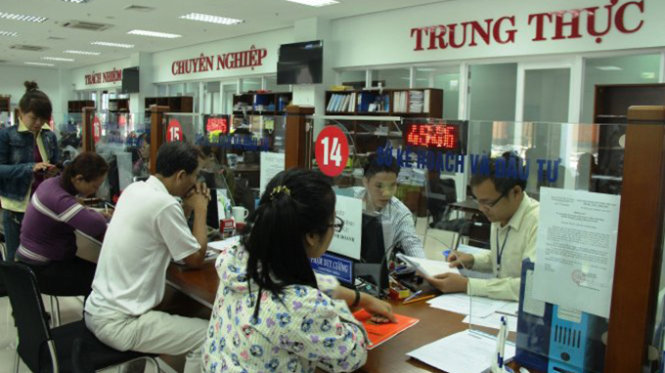Editor’s note: Pham Nguyen, a 31-year-old Ho Chi Minh City resident, hopes that Vietnamese people will be served by friendly public servants for paperwork by 2035, as he wrote to the “Ky Vong Viet Nam 20 Nam Toi” (“My Expectations for Vietnam in 20 Years”) writing contest.
My expectation for Vietnam in the 20 years to come is that citizens who visit state administrative agencies for paperwork would feel their best as the staff there would be cheery and helpful.
The state administrative agencies would then look neat and nice with fresh flowers and drinking water available for waiting people. Government employees there are supposed to act as if they were people's "servants." They would give clear explanations in a polite manner and provide the requested additional papers in writing. They would not be reluctant to apologize to service seekers for their tardiness in processing the paperwork, and would not hesitate to thank the service seekers for their constructive criticisms. They would also be willing to scurry to get the paperwork done promptly when such seekers are in a hurry. In addition, parking attendants at such agencies would be considerate enough to park their clients' bikes at the most handy spots and refuse to receive fees even if the clients insist.
When citizens do not find the way office workers handle their cases satisfactory, local leaders on duty that day would be willing to reconsider the cases, with a sign on their office doors that reads "Just come in." The service seekers would go home contented, and tell their family members about their good day at the state administrative agencies.
In the current situation, people typically feel anxious and not at ease when they come to state administrative agencies to get paperwork done, such as duplicating and certifying, or learning about procedures to obtain house ownership documents or family record books, due to the unwelcoming attitudes presented by a number of public servants. Instead of giving meticulous explanations to service seekers as they are supposed to, such government staff members at a number of agencies leave their clients waiting or give cursory explanations.
Several such staffers also perturb service seekers by having them wait relentlessly or demanding they bring different documents each time. This has resulted in brokers’ bursting activity, which causes preventable disorder at state administrative agencies and undermines people’s trust in the state apparatus.
Some claim that these public servants, who are paid meager salaries, only give perfunctory explanations and do not bother to help service seekers with their whole heart. In times of financial difficulty, the government has always strived to raise public servants’ salaries to ensure their life quality.
However, salaries have hardly inched up even as consumer prices have skyrocketed. In my opinion, in the next 20 years, civil servants’ salaries should be further raised to considerably improve the living conditions of those working in the state apparatus.
With good pay, these public servants would no longer devise different ways to earn more income and would thus be wholeheartedly devoted to their job and be as helpful as they can to service seekers.
Reality has shown that at such state administrative agencies, if leaders demonstrate integrity and are exemplary, their employees will certainly follow their example and refrain from pestering service seekers. The other way round may also apply.
Therefore, it’s advisable that leaders at ward or district levels or even higher often “role play” as citizens who come to local administrative agencies to get their paperwork done so as to have a better grasp of the actual situation and see if red tape persists. If they could manage to do so, we would surely enjoy a satisfactory state apparatus.
Those officials who grimace, yell at or demand “tips” from service seekers are supposed to be slapped with penalties including position removal, dismissal and exposure in the media to set examples for others.
Administrative agencies at different levels, and even departments within the same agencies, should hold weekly or monthly voting sessions for the “most friendly, helpful civil servant” instead of doing so every quarter, which is quite a long interval.
Employees who are people’s favorites should be honored every Monday and be conferred with an according monetary award. This is indicative of fairness and not a favor for certain employees or equation of every staffer’s contributions.
|
“Ky Vong Viet Nam 20 Nam Toi” is a competition organized by the World Bank in Vietnam and Tuoi Tre (Youth) newspaper that encourages local youths to write down their wildest, yet feasible, dreams about how Vietnam will change in 20 years’ time. |




















































